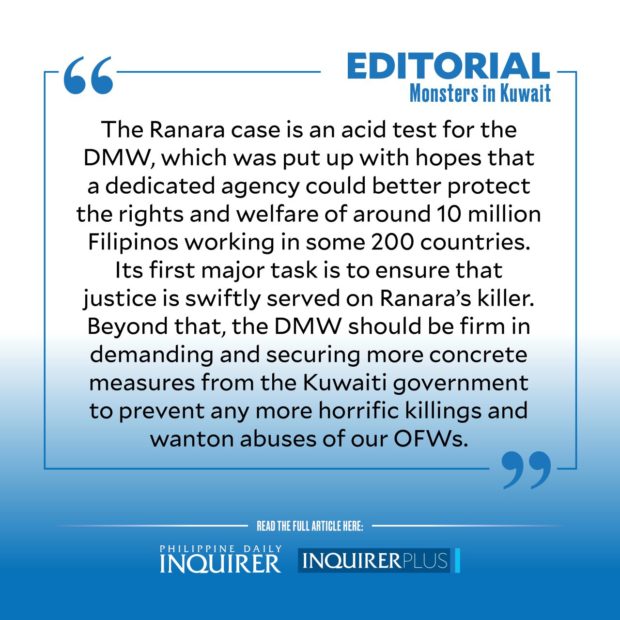Monsters in Kuwait
 It is fair to think that Jullebee Ranara, a 35-year-old mother of four, went to Kuwait as a domestic worker so she could provide a brighter future for her children, just like millions of overseas Filipino workers (OFWs) toiling in all corners of the world.
It is fair to think that Jullebee Ranara, a 35-year-old mother of four, went to Kuwait as a domestic worker so she could provide a brighter future for her children, just like millions of overseas Filipino workers (OFWs) toiling in all corners of the world.
It is the perennial lack of jobs to improve one’s lot and rise from generational poverty that has driven OFWs like Ranara to foreign shores where, presumably, jobs and better salaries await them. Instead, she—and many others before her—came home in a box.
What happened to Ranara was plain evil. According to various reports, her employer’s 17-year-old son raped and impregnated her, beat her to death, ran her over twice with his car, burned, and finally dumped her body in the desert. Before her gruesome killing, Ranara was able to call her family back home and tell them about the abuse she has been suffering from her young tormentor and eventual killer. She ended up alone, and succumbed to the cruelty and savagery she had endured in that Kuwaiti household. On Friday night, a wooden box containing her remains was all that her grieving family received.
Kuwait’s ambassador to Manila, Musaed Saleh Althwaikh, reportedly told Department of Migrant Workers (DMW) Secretary Susan Ople that Ranara’s “tragic passing was an isolated case.” Has the good ambassador forgotten the three other cases of OFWs who were just as brutally killed by his compatriots only recently? Let us refresh his memory: Joanna Demafelis, 29, went missing in 2016, her body later found stuffed in a freezer in her employers’ abandoned apartment in 2018 where it had reportedly been left for a year; Ma. Constancia Lago Dayag, 47, killed in 2019 after being physically and sexually assaulted by her employer; Jeanelyn Villavende, 26, sexually assaulted, and ruthlessly killed by her female employer out of jealousy, also in 2019.
Outraged by Demafelis’ callous killing, then President Rodrigo Duterte banned the deployment of OFWs to Kuwait, one of the Philippines’ top destinations for labor export. His administration hammered out a 2018 agreement with Kuwait for more protection for OFWs, including a ban on the employers’ practice of confiscating their passports and travel documents. Despite the agreement, another brutal killing in 2019—that of Villavende—prompted Duterte to impose another temporary deployment ban.
Kuwait has proven to be a hostile workplace for OFWs, particularly female domestic helpers who are trapped in their employers’ homes. According to the Philippine Overseas Workers Welfare Administration, 196 Filipino workers have died in Kuwait since 2016, 80 percent of the deaths traced to physical abuse. In 2017 alone, the Philippine embassy in Kuwait recorded 6,000 cases of abuse, sexual harassment, and rape of OFWs.
Almost every year, the Philippine government has to repatriate hundreds of OFWs fleeing abusive conditions in Kuwait. Just this month, more than 400 OFWs have sought shelter in a Philippine-run emergency center due to abuse and other labor issues such as nonpayment of salaries. Clearly, this is an alarmingly high abuse and death toll and far from being isolated cases, prompting an outcry from our senators to reimpose the deployment ban in the Gulf state.
But Ople has rejected these calls, saying a ban could even be more harmful to OFWs who might be prevented by their employers from leaving. It could also lead to undocumented workers going to Kuwait through other Middle East countries, thus forfeiting the government protection that legal OFWs can at least bank on.
Short of a ban, what reforms and assurances can the Philippines get from the Gulf state to ensure that our OFWs don’t end up abused and killed? As twice proven during the Duterte administration, even with an agreement for workers’ protection, the abuses and the killings have persisted.
The Ranara case is an acid test for the DMW, which was put up with hopes that a dedicated agency could better protect the rights and welfare of around 10 million Filipinos working in some 200 countries. Its first major task is to ensure that justice is swiftly served on Ranara’s killer.
Beyond that, the DMW should be firm in demanding and securing more concrete measures from the Kuwaiti government to prevent any more horrific killings and wanton abuses of our OFWs.
But even Ople concedes that Ranara’s killing was “brutal not because it was committed, or wanted to be committed, by the Kuwaiti government. [It was] brutal because the employer’s son is a monster,” she said.
Which is why the government should take a long hard look at deploying OFWs to states whose culture and practices do not respect human rights, especially those of workers who are most vulnerable to abuse. The DMW’s priority should be as protector, not exporter, of OFWs. Ultimately, the government must wean itself off dependence on the billions of dollars in OFW remittances to prop up the economy because this comes at a high price—broken families, abandoned children, and tragically, the abuse and inhuman killings of OFWs by monster-employers in foreign lands.
















